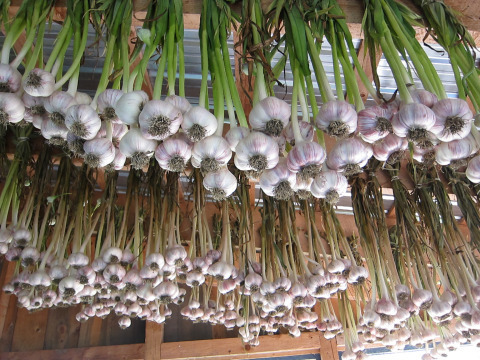File Under: Things I Barely Understand But That’s OK Because Penny Does
There were a number of requests after Wednesday’s post to talk a bit more about the soil remineralizing we’ve done over the past few years.
I will tell you what I know, but here’s the cold, hard truth: Like so much of the knowledge that makes this place tick, soil amending is resides in Penny’s bag of tricks. She’s always been the green thumb ’round these parts; about all I’m good for in the garden is popping potato larvae (and this year, as I noted, there’s hardly any of that, which is almost disappointing, given the satisfaction I glean from this particular task) and weeding. And eating. I’m real good at eating.
Anyhow. About four years ago, Penny got turned onto a fellow named Dan Kittredge, who is one of those wickedly smart folks that I find sort of intimidating. Smart people do that to me with some frequency; maybe it’s a bit of an inferiority complex on my part for never having completed my skooling, or maybe it’s just that I never really understand what the hell they’re talking about.
Penny, on the other had, does seem to understand what Dan’s talking about, especially after taking a couple years worth of classes and workshops and whatnot. And what he’s talking about, best as my addled brain can cipher, is that most of the soils ’round these parts (and, I’m guessing, ’round your parts) are severely lacking in essential minerals and enzymes. This is probably the result of having been farmed for decades without having had these things restored, or it might be from erosion, or whatever. But the basic precept is that unless you restore the mineral balance, you’ll never realize the genetic potential of your crops. They won’t produce as much, they won’t be as resistant to pests and disease, the crop won’t store as well, and it sure as heck won’t be as nutritive as it could be.
I gotta say, when I first heard about all this (which is to say, when Penny returned from her first workshop, giddy with excitement), I was downright skeptical. After all, we had great soils: Tremendous organic matter, and the soil tests we were getting at the time all came back looking right good. And yet, even I had to admit that our gardens (we have three rather huge gardens, plus all the assorted berry bushes, fruit trees, and whatnot) were inconsistent at best. Some things did ok, some did great, and plenty did neither. It never really made much sense to us why things weren’t producing the way it seemed they should be.
This is no longer the case. While we still have the occasional curiosity (this year, for instance, the tomatoes aren’t as robust as they were last year, although this might have something to do with the fact that it was really freakin’ cold in May, when they were potted on the unheated, glassed in porch), almost everything we grow these days is pretty much astounding in flavor, storage capacity, and all around vigor. It’s a marked difference from a handful of years ago; in many cases, we are having to plant much less of a particular crop, since the yields per row are so much higher. That might all sound like I’m bragging, and for that, I apologize. But that doesn’t make it untrue.
I’m now going to skip all the stuff I don’t understand or know, such as what, specifically, Penny’s amended with and why. But the truth is, it wouldn’t be much help to you, anyway. The key to all this is that you’ve got to start with a really good soil test and you’ve got to have some basis for understanding how to amend in relation to that test, and how these minerals work symbiotically. If Dan happens to be doing a workshop in your area, I’d highly recommend attending. He’s a fantastic presenter and despite my third paragraph comments, does a good job of making this stuff intellectually accessible. (I have been to one of his workshops, myself)
There are a few downsides to all of this: It demands at least a layperson’s knowledge of soil science. It is also not cheap; I bet we’ve spent a grand on minerals and other amendments over the past few years. Nor are many of these amendments readily available on a hyperlocal basis. These are absolutely not inconsequential issues. But the idea is that once you get the balance back, you’re set for a long, long time. Indeed, we added almost nothing to our gardens this year, with the exception of a bit of homebrew compost. It will be interesting to see how things progress over the next few years.

Ben Hewitt's Blog
- Ben Hewitt's profile
- 37 followers




